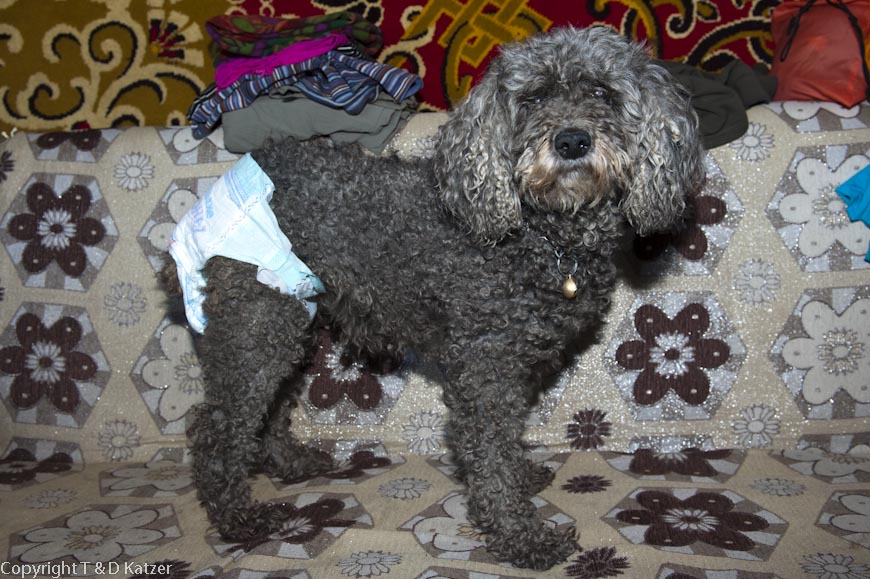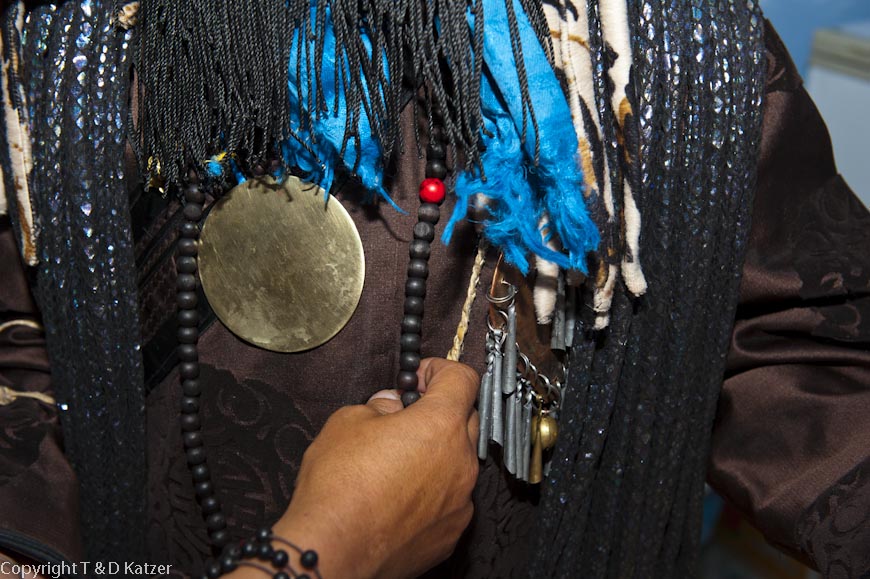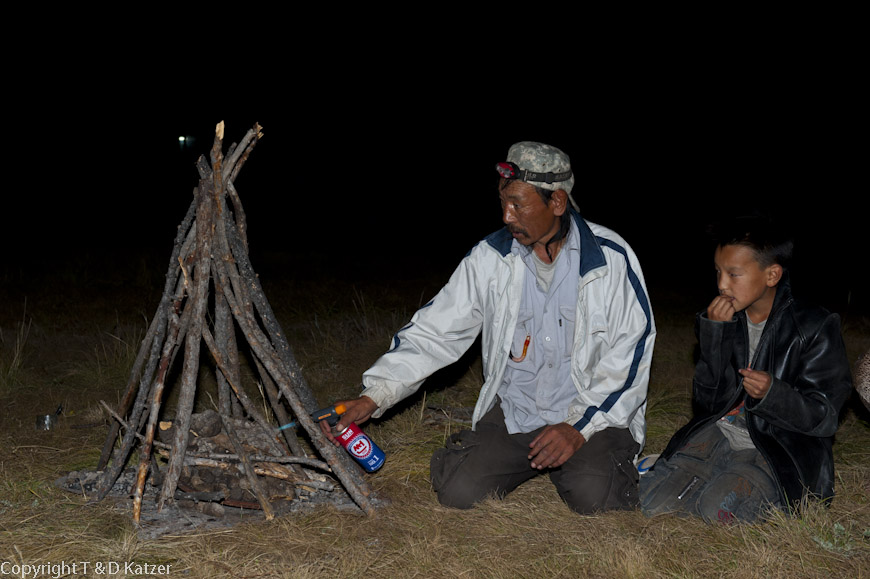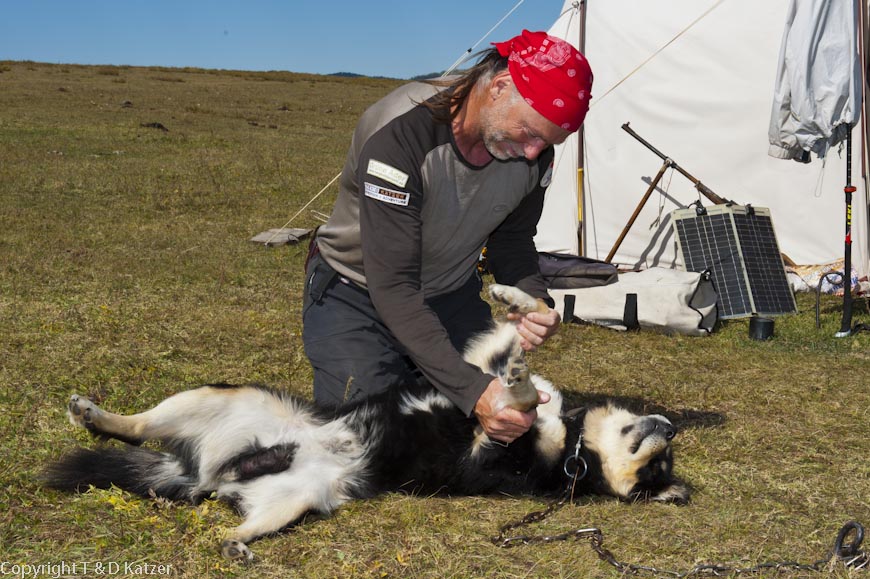
White and black shaman
N 49°01'656'' E 104°03'559''
Day: 419-431
Sunrise:
06:40/06:57
Sunset:
19:17/18:51
Total kilometers:
2517
Soil condition:
Asphalt
Temperature – Day (maximum):
2 °C/ 21 °C
Temperature – day (minimum):
minus 4 °C/ 15 °C
Temperature – Night:
minus 0 °C/ minus 6 °C
Latitude:
49°01’656”
Longitude:
104°03’559”
Maximum height:
1304 m above sea level












After a pleasant night, we are woken up at 6:00 a.m. by a Chinese lady who speaks to the tune of Hänschenklein. “What’s that?” asks Tanja. I point to the electronic calendar hanging above the bed. After the fairytale melody with its strange voice falls silent, we try to get some more sleep. At 7:00 a.m. the Chinese woman belts out another German folk song, at 8:00 a.m. there is a heavy knock on the iron door of the apartment while the electronic voice once again fills the room with joy. Tovuu and Baatar wish us a good morning and apologize for the disturbance. Sissi, who they have brought with them, jumps back and forth excitedly. “We just get our ceremonial dishes for a shaman ritual,” explains Baatar. “Shaman ritual?” asks Tanja with interest. “May I accompany you. I would love to witness a ceremony like this.” “Of course you would. Pack your things. We’re about to leave,” Baatar replies. “Uh, Denis. We’ll leave Sissi there. Is that all right with you?” asks Tovuu. “Sure.” When he pulls a baby diaper over Sissi’s bottom, I can’t believe my eyes. “When the diaper is full, all you have to do is throw it in the trash can,” explains Tovuu. “In the garbage can,” I reply succinctly. “Tijmee,” he says in the affirmative and says goodbye. When the heavy door slams shut, I am alone with the little poodle lady, whose bottom is now adorned with a diaper. Sieh puts her head to one side and looks at me curiously. “Just don’t put any big, smelly eggs in there,” I admonish her. Sissi answers with a whimper. Then she jumps onto the couch to make herself comfortable with her diaper bottom on it. “Well, that could be something,” I grumble, setting about washing garment after garment in the bathtub and hanging them in the sun on the narrow balcony.
In the afternoon I notice Sissi’s diaper hanging suspiciously heavy. “It’s full, isn’t it?” I ask her. I take her bright bark as a yes. I feel the fabric and notice that there really is something in it. When I undid the diaper, it was soaked with urine. Disgusted, I throw the thing in the bin. “And what do we do if something bigger comes along? You’ve pissed all over your diaper and there’s no replacement,” I say reproachfully. Sissi doesn’t seem to care and jumps back onto the couch with her unprotected butt. After a few minutes of reflection, I realize the decadence of the situation. I untie a rope from my solar panel, tie it to Sissi’s collar and take her for a walk. As soon as we are outside, she lays a few of the eggs in the grass. “Good girl,” I praise her and take her back to the apartment after a short walk.
Hours later, my cell phone rings. “You have to see this Denis. There’s a fire ceremony tonight. We’ve both been invited. You can even take photos before the ritual. They promised me that,” says Tanja enthusiastically.
In the evening, Tzolaa picks us up in her car and drives us to her home. As soon as we get out of the car, we are introduced to the shaman named Oyunchimeg and her husband Ganbat. “We’re delighted to have you with us tonight,” says Ganbat in a friendly manner. We are invited into the large log cabin. The furnishings here are also modern, which is why the TV with its flat screen is not missing. “Come upstairs,” Tzolaa asks us. We climb the wooden staircase to the second floor, which consists of just one cozy room. The walls and sloping ceilings are covered with sky-blue cloud wallpaper. Apart from a sprawling double bed, a few stools and a folding table, there is hardly any furniture. We settle down on the carpet. It doesn’t take long for Tzolaas parents to join them. Oyunchimeg prepares the table with the offerings while her husband Ganbat shows me the two richly decorated shaman robes. “The yellow robe belongs to the white shaman and the brown robe belongs to the black shaman.” “Will two shamans be leading us through the ceremony today?” I ask in surprise. “Yes and no. Oyunchimeg is both in one person. First she puts on the brown cloak and calls the spirit of the black shaman, who is 720 years old by the way. We can then talk to him. Then the spirit of the black shaman withdraws, whereupon Oyunchimeg puts on the white shaman’s cloak and summons his spirit. When the spirit enters her body, we can spend time with the white shaman,” explains Ganbat. “How old is the white shaman?” “900 years.” “Wow. And what’s the difference between the two shamans? Is the black one evil?” “No, the black shaman just has different tasks to the white one.” “And what are they?” “For example, if things aren’t going well in your life, you can ask him why. He is responsible for questions about your past and future. Or to realize your wishes, dreams and goals. You can also say that a black shaman is an advisor of life. The white shaman is mainly responsible for cleansing you of bad spirit. He uses a staff with many small metal objects hanging from it.” “Is that the one on the cushion?” I point to a strange-looking stick. “Yes. The shaman hits this stick, as you call it, on the back of the questioner. It hurts a little but it drives away the bad spirits. This also means that a person can only be healthy if he is not haunted by evil spirits.” “Which in turn means that the white shaman is a healer?” “Yes, he can heal. That’s one of his main tasks.” “Interesting. And how long does it take to train as a shaman?” “For a black and white shaman, 13 years. But there are also Indian shamans whose training only takes seven years.” “Why is it shorter?” “Because their shamanic ancestors can be traced back to the Stone Age. They have much more experience than white or black shamans whose ancestors are only a few thousand years old at most.” “That means that every shaman has ancestors who were also shamans?” “Yes.” “And how do you become a shaman?” “When a shamanic teacher recognizes the abilities in the person.” “Does an Indian shaman have anything to do with the Native Americans?” “Yes. The reason is because shamanism has its roots in Mongolia. The shamanism of the Eskimos in Alaska or the indigenous people of the jungles of South America all have the same origins.” “And what does a shaman do for a living? Do they also perform rituals for money?” “Never. A shaman may not accept money. Shamans are here to help other people. You can decide for yourself what the help of a shaman is worth. Some people give 500 Tugrik, (0,30 €) others 100..000 Tugrik. (60,- €) As I said, everyone gives what they want voluntarily.”
“Can I take a photo of the robes?” “Sure, but please don’t touch them. That wouldn’t be good for you. I wear special rings that protect me.” I take a few photos with respect. Before I take pictures of the various shamanic tools decorated with animal heads, hair, ribbons and small metal objects, I ask Oyunchimeg if this is allowed. “Yes, they’re dead at the moment. That’s not a problem in this state. It’s only during a ceremony that photography is not allowed. The spirits don’t want that,” she explains readily.
Meanwhile, four candles burn on a low round table. Rice, milk, salt, aruul and vodka are offered to the spirits in small brass bowls. On a small table next to it lies the shaman’s pipe, silver rings, bracelets, two necklaces with wooden beads and incense. While Gamba helps his wife into her shamanic clothes, Tzolaas mother prays in front of the altar. As we have observed on previous trips to orthodox monasteries and in Tibet, Altansetseg throws herself on her knees, then lies down lengthwise before rising up again. She repeats this strenuous procedure several times.
“You can photograph Oyunchimeg in her robe before the ceremony,” says Ganbat. As I press the shutter release, Oyunchimeg stands before me in full regalia. To test this, it hits the drum a few times and slowly rotates 360 degrees. Something happens unexpectedly that nobody expected. The shaman suddenly whirls around her own axis so that her robe flings across the room like a fan. In a few seconds, their drumming increases to short, rapid strokes that are catapulted through the air and space like their garments. I press the shutter button in shock. A fraction of a second later, Oyunchimeg collapses on a stool, breathing heavily. “What’s wrong?” asks Ganbat worriedly. “I was just trying out my drum when the spirit hit me. I just managed to stop it,” she breathes heavily. Her chest rises and falls violently. Then she calms down again. “It’s time to go outside,” she says, regaining control of herself. We go in front of the log cabin. Bilgee and his son Orgiltenger light a fire.
Ganbat and Altansetseg’s husband, Erdenee, help the shaman get ready for the ceremony. Now dressed, she sacrifices vodka and milk to the gods and spirits. Her facial features show concentration. She then hurls the liquids into the blackness of the night again. Now everything happens very quickly. The shaman begins to beat her drum, dances around her own axis a few times and sits down on a stool. She begins to speak. Astonished, we hear the voice of an old man that bears not the slightest resemblance to Oyunchimeg’s timbre. The attendees ask questions we don’t understand and the spirit that has entered the forty-eight-year-old answers hotter and croakier. The situation changes again abruptly. Ganchimeg, the fifteen-year-old daughter of Bilgee’s sister, translates for us in broken English. “The white shaman has asked the black man to leave the body.” “What does that mean?” “Shh,” she puts her finger to her lips. “Your time is up today. I want to speak to the people now,” he says. Then the shaman slumps forward. When she stands up again, she asks in her own voice what has happened. Those present explain to her what the white shaman has asked for. “Well, I’ll change now,” she decides, gets up and lets Ganbat and Erdenee help her out of the black shaman’s robe.
Just 10 minutes later, she whirls through the night drumming loudly as a white shaman. As the 900-year-old spirit enters her, she sits back down on the stool in front of the fire. For a while, all you can hear is the crackling of the fire. The shaman’s robe from a bygone era, adorned with signs and bells, is illuminated by the flickering flames, just like coming and going shadow spirits. The moment is spooky, soon a little eerie. “Hi, hi, hi!”, the ancient being laughs quietly to itself in an ancient voice, as if it is pleased to have displaced the black shaman. In fact, the being now present seems to be of a completely different character. It laughs incessantly. Then she blesses one or the other. “Do you think I can ask him for something?” I ask Ganchimeg, who immediately passes my question on to the shaman. I wait anxiously for his reaction. “He asks you to go to him. Go around the front. The spirits don’t like anyone moving behind them,” the girl explains. “Kneel down,” I hear, whereupon I sit down in front of the splendidly dressed woman. “Your head, you must bow your head,” whispers Ganchimeg. I rest my upper body on my knees, stretch out so that my head is touching the shaman’s robe and my palms are facing upwards on the floor. The shaman’s hand touches the back of my head. It feels warm and good. Words are murmured that I don’t understand. Then someone pulls my shirt out of my trousers and rolls it up to my neck. “Tschack! Tchack! Tschack!”, the cane slaps my bare skin. It feels cold, hard but still good. “Chop! Chop! Tschack!”, clap the whip-like lashes. After a few minutes, the shaman has apparently exorcized all my evil spirits. “Do you have any wishes?” whispers Ganchimeg, translating the spirit’s words. I listen to the crackling of the fire for a few moments. “I would like to thank the Mongolian people for their hospitality, for the good progress of our expedition, for the wonderful time in which we have learned so much and for allowing us to gain a deep insight into your life and culture.” “We don’t need a translation. Your German shaman is sitting on my shoulder. I understand every word. We humans may look different, speak different languages, but we are all one family with the same origins. We are all one. Thank you for being here in this group. It’s something special for me. Do you have a wish?” “I would like to have a healthy and pain-free back,” I say. “In three days, you won’t have any more pain. What else can I do for you?” “I would like you to bless the book I have written about our journey and your country. I would be very happy if it is successful.” “I hereby bless your book and it will be successful. Do you have any more wishes? You can wish for anything you want.” “I wish for many more interesting trips with my wife Tanja and good health for both of us and our family.” “You will experience many more years of traveling together. You have a happy, fulfilling and successful journey ahead of you. Your life is a blessed life. Your love for your wife is great and strong. Your bond will not be broken by anything,” he croaks hotly and softly.
After I have no more wishes, I am asked to stand up and walk backwards away from the shaman. Then Ganbat hands me a small bowl of vodka. “Concentrate on your wishes and sacrifice the contents to the gods and spirits,” he urges me in a whisper. I stand there and review my wishes. Then I hurl the alcohol into the night sky and rejoin the group in front of the shamans. Laughter rings out over and over again. “Let’s sing together,” says the hotter voice from a forgotten world, whereupon those present sing beautiful Mongolian songs. “Boom! Boom! Boom!” the shaman’s drum sounds incessantly to the chant. “Boom! Boom! Boom!” it booms into the night. The fire crackles, Bilgee adds a few more logs. Smoke envelops the idiosyncratic community. During breaks in the singing, the shaman is served vodka, milk or his pipe. Ganbat and Erdenee constantly take care of the old spirit. “Boom! Boom! Boom!”, he beats his drum for many hours. In between, he talks and laughs a lot.
At 1:00 a.m. the shaman takes his leave, whereupon the human body immediately sinks forward. Seconds pass before the body rises again and Oyunchimeg’s voice can be heard under the mask. She pulls her headdress off her head and smiles at us. “Come and join me. I want to take a few pictures with you,” she says and we smile into the camera to capture this unforgettable evening forever.
We look forward to your comments!

